英语四六级考试七种重点语法
大学英语四级考试的考点有哪些知识点汇总
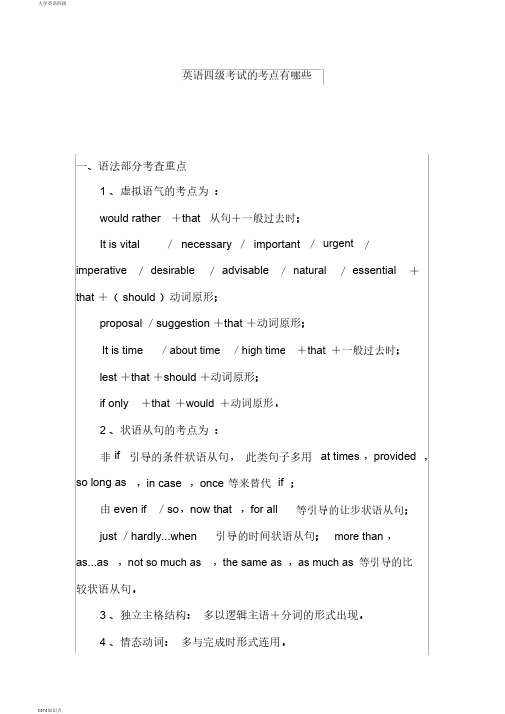
英语四级考试的考点有哪些一、语法部分考查重点1 、虚拟语气的考点为:would rather+that从句+一般过去时;It is vital/necessary/important/urgent /imperative /desirable /advisable /natural /essential +that +( should )动词原形;proposal /suggestion +that +动词原形;It is time/about time/high time+that+一般过去时;lest +that +should +动词原形;if only+that+would+动词原形。
2 、状语从句的考点为:非if 引导的条件状语从句,此类句子多用at times ,provided ,so long as ,in case ,once 等来替代if ;由 even if /so,now that ,for all 等引导的让步状语从句;just /hardly...when引导的时间状语从句;more than ,as...as,not so much as,the same as,as much as等引导的比较状语从句。
3 、独立主格结构:多以逻辑主语+分词的形式出现。
4 、情态动词:多与完成时形式连用。
5、定语从句:重点考查介词+关系代词(which)和 as 作为关系代词。
二、词汇部分考查重点1、动词、名词与介词的搭配如: popular /patient +with ;yield /s olution /adapt /transfer /access +to ;accuse/require +of ;charge +for ;under +discussion等等。
2、习惯用法如: confess to /set about /be used to +doing ;be supposed to /have/make sb.+ do 等。
(简明版)大学英语四级语法大全

(简明版)大学英语四级语法大全一、名词(Noun)名词是一个词汇类别,用于表示人、动物、事物、地点等。
在句子中,名词可以作为主语、宾语、定语、表语等。
例如:- 主语:Cats are cute animals.Cats are cute animals.- 宾语:I love dogs.dogs.- 定语:The green tree is beautiful.green tree is beautiful.- 表语:My brother is a doctor.doctor.二、代词(Pronoun)代词是一个词汇类别,用于替代名词。
它们可以替代特定的人或事物,以避免重复使用相同的名词。
例如:- 人称代词:I am going to the store.I am going to the store.- 物主代词:That book is mine.mine.- 指示代词:This is my car.This is my car.- 相互代词:They saw each other at the party.each other at the party.三、形容词(Adjective)形容词是用于描述名词或代词的词汇。
它们可以提供关于名词或代词的特征、性质、状态等信息。
例如:- 描述名词:She has a beautiful voice.beautiful voice.- 描述代词:I am so tired.so tired.- 修饰词组:He bought a red sports car.red sports car.四、副词(Adverb)副词是用于描述动词、形容词、其他副词或整个句子的词汇。
它们可以提供关于时间、地点、程度等信息。
例如:- 描述动词:She sings beautifully.beautifully.- 描述形容词:He is extremely tall.extremely tall.- 描述副词:She runs very fast.very fast.- 描述整个句子:Certainly, I can help you.Certainly, I can help you.五、动词(Verb)动词是用于表示动作、状态或发生事件的词汇。
英语四六级语法总结大全
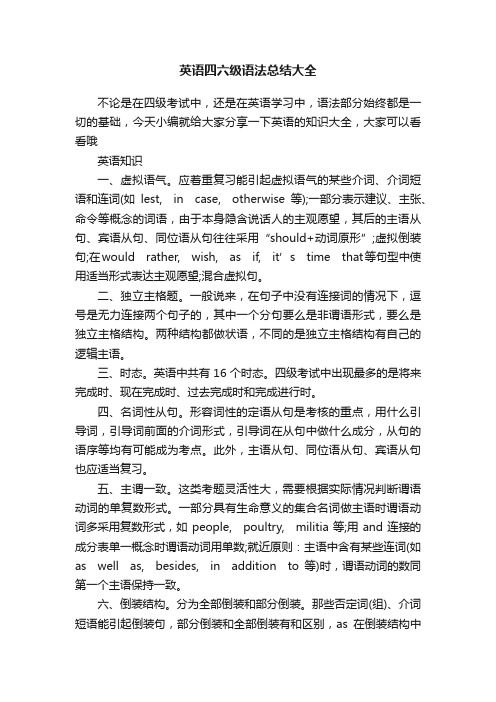
英语四六级语法总结大全不论是在四级考试中,还是在英语学习中,语法部分始终都是一切的基础,今天小编就给大家分享一下英语的知识大全,大家可以看看哦英语知识一、虚拟语气。
应着重复习能引起虚拟语气的某些介词、介词短语和连词(如lest, in case, otherwise等);一部分表示建议、主张、命令等概念的词语,由于本身隐含说话人的主观愿望,其后的主语从句、宾语从句、同位语从句往往采用“should+动词原形”;虚拟倒装句;在would rather, wish, as if, it’s time that等句型中使用适当形式表达主观愿望;混合虚拟句。
二、独立主格题。
一般说来,在句子中没有连接词的情况下,逗号是无力连接两个句子的,其中一个分句要么是非谓语形式,要么是独立主格结构。
两种结构都做状语,不同的是独立主格结构有自己的逻辑主语。
三、时态。
英语中共有16个时态。
四级考试中出现最多的是将来完成时、现在完成时、过去完成时和完成进行时。
四、名词性从句。
形容词性的定语从句是考核的重点,用什么引导词,引导词前面的介词形式,引导词在从句中做什么成分,从句的语序等均有可能成为考点。
此外,主语从句、同位语从句、宾语从句也应适当复习。
五、主谓一致。
这类考题灵活性大,需要根据实际情况判断谓语动词的单复数形式。
一部分具有生命意义的集合名词做主语时谓语动词多采用复数形式,如people, poultry, militia等;用and连接的成分表单一概念时谓语动词用单数;就近原则:主语中含有某些连词(如as well as, besides, in addition to等)时,谓语动词的数同第一个主语保持一致。
六、倒装结构。
分为全部倒装和部分倒装。
那些否定词(组)、介词短语能引起倒装句,部分倒装和全部倒装有和区别,as在倒装结构中的用法及意义等等,都是考生应当重视的地方。
七、非谓语动词。
①根据非谓语动词同其所修饰的名词或逻辑主语的一致关系,确定使用主动语态或被动语态,然后考虑采用现在分词、现在分词被动式或过去分词;②非谓语动词同主句谓语动词动作发生的先后关系。
四级语法知识点大纲

四级语法知识点大纲第一节:名词1.定义:名词是表示人、事物、地点、概念等的词语。
2.分类:可数名词和不可数名词。
3.句中作用:名词在句子中可以作主语、宾语等成分,还可以通过所有格形式表示所属关系。
第二节:代词1.定义:代词是用来代替名词或名词词组的词语。
2.分类:人称代词、物主代词、指示代词、疑问代词、不定代词等。
3.句中作用:代词可以替代名词,使句子更加简洁明了。
第三节:动词1.定义:动词是表示动作、状态或变化的词语。
2.分类:及物动词和不及物动词。
3.句中作用:动词可以作谓语,表示主语的动作或状态,也可以作状语、宾语等成分。
第四节:形容词1.定义:形容词是用来描述名词或代词性质、特征、状态等的词语。
2.句中作用:形容词可以修饰名词或代词,使句子更具描述性和表达力。
第五节:副词1.定义:副词是用来修饰动词、形容词、副词、句子等的词语。
2.句中作用:副词可以表示时间、地点、程度、方式等,增加句子的信息量和表达的准确性。
第六节:介词1.定义:介词是用来表示名词或代词与其他词语之间的关系的词语。
2.句中作用:介词可以表示时间、地点、方式、原因等,丰富句子的含义和表达的层次。
第七节:连词1.定义:连词是用来连接单词、短语或句子的词语。
2.分类:并列连词、从属连词。
3.句中作用:连词可以让句子结构更加完整,使语言更加流畅。
第八节:数词1.定义:数词是表示数量或顺序的词语。
2.分类:基数词和序数词。
3.句中作用:数词可以表示数量、顺序或比较,使句子更具体、准确。
第九节:感叹词1.定义:感叹词是用来表示强烈的情感或感叹的词语。
2.句中作用:感叹词可以表达惊讶、赞叹、喜悦等情绪,增强句子的感情色彩。
通过以上九个知识点的学习,我们可以更好地理解和运用英语语法。
掌握这些知识点,对于学习和提高自己的英语水平具有重要的帮助。
希望大家能够认真学习,不断练习,进一步提升自己的英语能力。
(完整版)英语四六级经典句型归纳
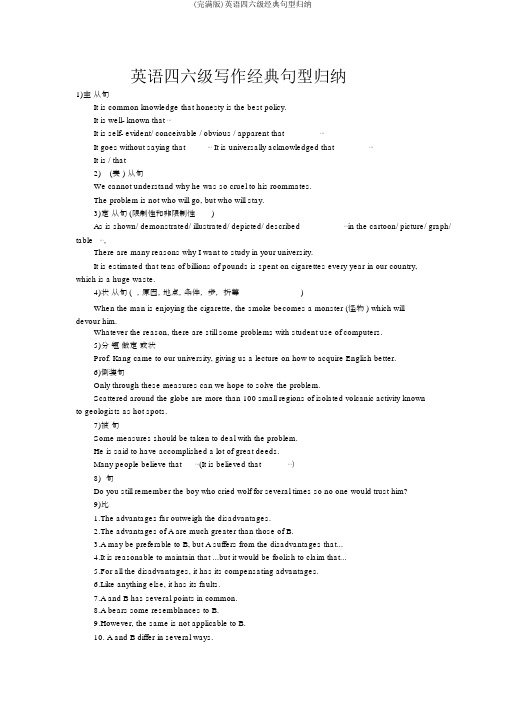
英语四六级写作经典句型归纳1)主从句It is common knowledge that honesty is the best policy.It is well- known that ⋯It is self- evident/ conceivable / obvious / apparent that⋯It goes without saying that⋯It is universally acknowledged that It is / that2) (表 )从句We cannot understand why he was so cruel to his roommates.The problem is not who will go, but who will stay.3)定从句 (限制性和非限制性)As is shown/ demonstrated/ illustrated/ depicted/ described⋯⋯in the cartoon/ picture/ graph/table⋯,There are many reasons why I want to study in your university.It is estimated that tens of billions of pounds is spent on cigarettes every year in our country, which is a huge waste.4)状从句 (,原因,地点,条件,步,折等)When the man is enjoying the cigarette, the smoke becomes a monster (怪物 ) which will devour him.Whatever the reason, there are still some problems with student use of computers.5)分短做定或状Prof. Kang came to our university, giving us a lecture on how to acquire English better.6)倒装句Only through these measures can we hope to solve the problem.Scattered around the globe are more than 100 small regions of isolated volcanic activity known to geologists as hot spots.7)被句Some measures should be taken to deal with the problem.He is said to have accomplished a lot of great deeds.Many people believe that⋯(It is believed that⋯)8)句Do you still remember the boy who cried wolf for several times so no one would trust him?9)比1.The advantages far outweigh the disadvantages.2.The advantages of A are much greater than those of B.3.A may be preferable to B, but A suffers from the disadvantages that...4.It is reasonable to maintain that ...but it would be foolish to claim that...5.For all the disadvantages, it has its compensating advantages.6.Like anything else, it has its faults.7.A and B has several points in common.8.A bears some resemblances to B.9.However, the same is not applicable to B.10. A and B differ in several ways.11.Evidently, it has both negative and positive effects.12.People used to think ..., but things are different now.13.The same is true of B.14.Wondering as A is ,it has its drawbacks.15.It is true that A ... , but the chief faults (obvious defects )are ...10)原因1.A number of factors are accountable for this situation.A number of factors might contribute to (lead to )(account for ) the phenomenon(problem).2.The answer to this problem involves many factors.3.The phenomenon mainly stems from the fact that...4.The factors that contribute to this5.The change in rgely results from the fact that...6.We may blame ...,but the real causes are...7.Part of the explanations for it is that ...8.One of the most common factors (causes ) is that ...9.Another contributing factor (cause ) is ...10.Perhaps the primary factor is that⋯11.But the fundamental cause is that ...11)果1.It may give rise to a host of problems.2.The immediate result it produces is ...3.It will exercise a profound influence upon...4.Its consequence can be so great that...12)批1)It is true that ..., but one vital point is being left out.2)There is a grain of truth in these statements, but they ignore a more important fact.3)Some people say ..., but it does not hold water.4)Many of us have been under the illusion that...5)A close examination would reveal how ridiculous the statement is.6)It makes no sense to argue for ...7)Too much stress placed on ... may lead to ...8)Such a statement mainly rests on the assumption that ...9)Contrary to what is widely accepted, I maintain that ...13)例1)A good case in point is ...2)As an illustration, we may take ...3)Such examples might be given easily.4)...is often cited as an example.14)明1)No one can deny the fact that ...2)The idea is hardly supported by facts.3)Unfortunately, none of the available data shows ...4)Recent studies indicate that ...5)There is sufficient evidence to show that ...6)According to statistics proved by ..., it can be seen that ...15)开篇1)Many nations have been faced with the problem of ...2)Recently the problem has been brought into focus.3)Recently the phenomenon has become a heated topic.4)Recently the issue has aroused great concern among ...5)Nowadays there is a growing concern over ...6)Never in our history has the idea that ... been so popular.7)Faced with ..., quite a few people argue that ...8)According to a recent survey, ...9)With the rapid development of ..., ...16)结尾1)From what has been discussed above, we can draw the conclusion that ...2)It is high time that strict measures were taken to stop ...3)It is necessary that steps should be taken to ...4)In conclusion, it is imperative that ...5)There is no easy method, but ...might be of some help.6)To solve the above-mentioned problem, we must ...7)In summary, if we continue to ignore the above-mentioned issue, more problems will crop up.8)With the efforts of all parts concerned, the problem will be solved thoroughly.9)We might do more than identify the cause ; it is important to take actions to ...10)Taking all these into account, we ...11)Whether it is good or not /positive or negative, one thing is certain/clear...英语四六级写作25 个加分句型一、 the + est + 名词+ (that) +the most + 形容词+ 名词主词+ have ever + seen (known/heard/had/read, etc)+ (that) + 主词+ have ever + seen (known/heard/had/read,etc)例句: Helen is the most beautiful girl that I have ever seen 。
四级语法知识点

四级语法知识点四级语法知识点一.不定式:一)不定式的常考形式:1) 一般形式:He decided to work harder in order to catch up with the others.被动形式: He preferred to be assigned some heavier work to do.语法功能:表示与谓语动词同步发生2) 完成形式:He pretended not to have seen me.被动形式:The book is said to have been translated into many languages.语法功能:表示发生在谓语动词之前二)不定式常考的考点:1)不定式做定语----将要发生2)不定式做状语----目的3)不定式充当名词功能---To see is to believe.三)不定式的省略1)感官动词 see, watch, observe, notice, look at, hear, listen to, smell, taste, feel+ do 表示动作的完整性,真实性;+ doing 表示动作的连续性,进行性I saw him work in the garden yesterday.昨天我看见他在花园里干活了。
(强调"我看见了"这个事实)I saw him working in the garden yesterday.昨天我见他正在花园里干活。
(强调"我见他正干活"这个动作)v 感官动词后面接形容词而不是副词:The cake tastes good; It feels comfortable.2) 使役动词 have bid make let 等词后不定式要省略但同1)一样被动以后要还原toI d like to have John do it.I have my package weighed.Paul doesnt have to be made to learn.3) help help sb do help sb to do help do help to do四)有些动词后只跟不定式如:want,wish,hope,manage,promise,refuse,pretend,plan, offer,decide,agree,expect allow sb to do, cause sb to do , permit sb to do, enable sb to doforce sb to do. be more likely to do love to do warn sb to do be able to dobe ambitious to do. begin to do . start to do五) 有的时候to后面要接-ing形式accustom (oneself) to; be accustomed to; face up to; in addition to; look forward to; object to; be reduced to; resign oneself to; be resigned to; resort to; sink to; be used to; be alternative to; be close/closeness to; be dedication/dedicated to; be opposition/opposed to; besimilarity/similar to.二. 动名词:具有动作性特征的名词1)是名词 seeing is believing2)具有动词性特征可以带宾语 starving troops is necessary.一)动名词的形式:一般形式:I dont like you smoking.完成形式:I regret not having taken your advice.被动形式:This question is far from being settled.二) 动名词常考的点1)动名词做主语谓语动词为单数2)在动名词和不定式中,做为介词的宾语是动名词3)动名词的否定直接在其前加否定词,通过代词的宾格或所有格形式给出逻辑主语.I would appreciate_______ back this afternoon.A.you to callB.you callC.you callingD.youre calling(Key:C your calling 也对)I regret not having taken your advice.4)有些词后只能接动名词admit; appreciate; avoid; celebrate; consider; contemplate; defer; delay; deny; detest; discontinue; dislike; dispute; enjoy; it entails; escape; excuse; explain; fancy; feel like; finish; forgive; cant help; hinder; imagine; it involves; keep; it means; mention; mind; miss; it necessitates; pardon; postpone; practice; prevent; recall; report; resent; resist; risk; suggest; understand...另外还有一些接-ing形式的常用说法:its no good; its no/little/hardly any/ use; its not/hardly/scarcely use; its worthwhile; spend money/time; theres no; theres no point in; theres nothing worse than; whats the use/point...5)有些词后加不定式和动名词均可remember, forget, try, stop, go on, cease, mean后面用不定式和-ing 形式,意义截然不容。
完整版)大学英语四级语法大全
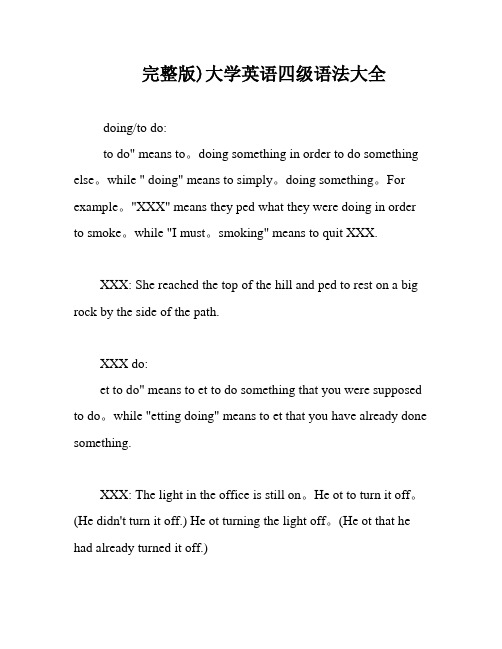
完整版)大学英语四级语法大全doing/to do:to do" means to。
doing something in order to do something else。
while " doing" means to simply。
doing something。
For example。
"XXX" means they ped what they were doing in order to smoke。
while "I must。
smoking" means to quit XXX.XXX: She reached the top of the hill and ped to rest on a big rock by the side of the path.XXX do:et to do" means to et to do something that you were supposed to do。
while "etting doing" means to et that you have already done something.XXX: The light in the office is still on。
He ot to turn it off。
(He didn't turn it off.) He ot turning the light off。
(He ot that he had already turned it off.)XXX do:Remember to do" means to remember to do something that you need to do。
while "remembering doing" means to remember that you have already done something.XXX: XXX.)Remember to go to the post office after school。
四六级语法知识点详解

四六级语法知识点详解英语四六级考试是大学英语水平考试的一种,对于很多学生来说,语法是其中一个比较难以掌握的部分。
本文将详细解释四六级考试中常见的语法知识点,帮助学生更好地应对考试。
一、时态和语态1. Simple Present Tense(简单现在时)简单现在时表示经常或习惯性发生的动作、真理、客观存在的事实等。
结构:主语 + 动词原形(第三人称单数在动词后加s或es)例句:I eat breakfast every morning.(我每天早上吃早餐)2. Present Continuous Tense(现在进行时)现在进行时表示现在正在进行的动作。
结构:主语 + am/is/are + 动词ing形式例句:She is studying in the library now.(她正在图书馆学习)3. Simple Past Tense(简单过去时)简单过去时表示过去某个时间发生的动作或存在的状态。
结构:主语 + 动词过去式例句:They visited their grandparents last weekend.(他们上周末去看望了他们的祖父母)4. Past Continuous Tense(过去进行时)过去进行时表示过去某个时间正在进行的动作。
结构:主语 + was/were + 动词ing形式例句:I was watching TV when she called me.(她打电话给我时,我正在看电视)5. Simple Future Tense(简单将来时)简单将来时表示将来要发生的动作或存在的状态。
结构:主语 + will + 动词原形例句:We will have a party next week.(我们下周要开个派对)6. Future Continuous Tense(将来进行时)将来进行时表示将来某个时间正在进行的动作。
结构:主语 + will be + 动词ing形式例句:I will be sleeping when you arrive.(当你到达时,我将正在睡觉)7. Passive Voice(被动语态)被动语态用于强调动作的承受者而不是施动者。
英语四级考试语法结构与词汇
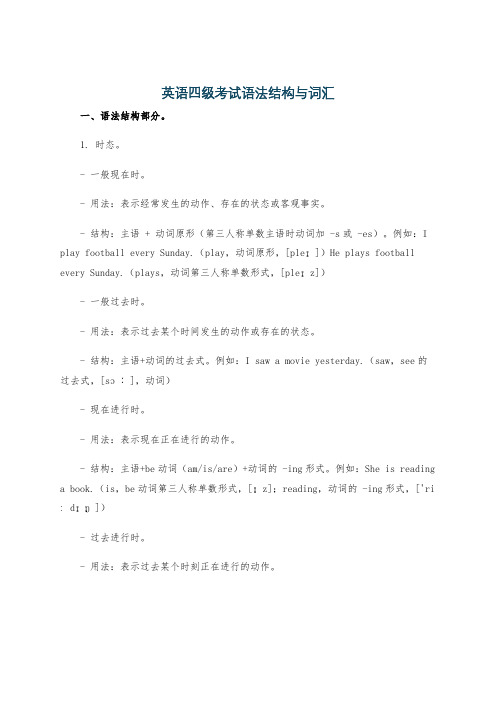
英语四级考试语法结构与词汇一、语法结构部分。
1. 时态。
- 一般现在时。
- 用法:表示经常发生的动作、存在的状态或客观事实。
- 结构:主语 + 动词原形(第三人称单数主语时动词加 -s或 -es)。
例如:I play football every Sunday.(play,动词原形,[pleɪ])He plays football every Sunday.(plays,动词第三人称单数形式,[pleɪz])- 一般过去时。
- 用法:表示过去某个时间发生的动作或存在的状态。
- 结构:主语+动词的过去式。
例如:I saw a movie yesterday.(saw,see的过去式,[sɔː],动词)- 现在进行时。
- 用法:表示现在正在进行的动作。
- 结构:主语+be动词(am/is/are)+动词的 -ing形式。
例如:She is reading a book.(is,be动词第三人称单数形式,[ɪz];reading,动词的 -ing形式,['ri ːdɪŋ])- 过去进行时。
- 用法:表示过去某个时刻正在进行的动作。
- 结构:主语+be动词(was/were)+动词的 -ing形式。
例如:He was watching TV at 8 o'clock last night.(was,be动词第一、三人称单数过去式,[wɒz];watching,动词的 -ing形式,['wɒtʃɪŋ])2. 从句。
- 定语从句。
- 概念:在句中作定语,修饰名词或代词。
- 关系代词:who(指人,主格,[huː]),whom(指人,宾格,[huːm]),which(指物,[wɪtʃ]),that(指人或物,[ðæt])。
例如:The boy who/that is standing there is my brother.(这里who/that引导定语从句修饰the boy)- 名词性从句。
大学英语4级语法笔记

大学英语4级语法笔记
1. 主谓一致
- 主语和谓语在人称和数上保持一致。
- 当主语是单数第三人称时,谓语动词要加s。
- 当主语是复数时,谓语动词不加s。
2. 动词时态
- 一般现在时:表示经常性或惯性的动作。
- 现在进行时:表示现在正在进行的动作。
- 一般过去时:表示过去某个时间发生的动作。
- 过去进行时:表示过去某一段时间内正在进行的动作。
- 现在完成时:表示过去某个时间发生的动作对现在造成的影
响或结果。
- 过去完成时:表示过去某个时间发生的动作对过去的另一个
时间或动作造成的影响或结果。
3. 形容词和副词的比较级和最高级
- 比较级:注意形容词和副词在比较级前面要加上more或less。
- 最高级:注意形容词和副词在最高级前面要加上the most或the least。
4. 名词所有格
- 表示属于关系时,在名词后面加's。
- 表示复数名词所有格时,在名词后面加'。
5. 祈使句和感叹句
- 祈使句表示命令、请求或建议,一般用动词原形。
- 感叹句表示惊讶、赞叹等情感,常以What、How等引导。
6. 介词的用法
- 介词用于表示位置、时间、方式等关系。
- 常用的介词有in、on、at、under、over等。
以上是大学英语4级语法的一些基础知识点,请在学习和写作时注意运用。
英语专业四级语法重点总结(精)
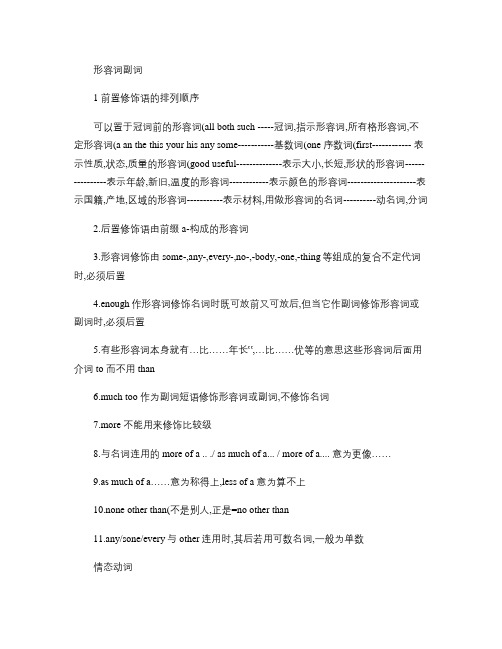
形容词副词1 前置修饰语的排列顺序可以置于冠词前的形容词(all both such -----冠词,指示形容词,所有格形容词,不定形容词(a an the this your his any some-----------基数词(one 序数词(first------------ 表示性质,状态,质量的形容词(good useful--------------表示大小,长短,形状的形容词----------------表示年龄,新旧,温度的形容词------------表示颜色的形容词---------------------表示国籍,产地,区域的形容词-----------表示材料,用做形容词的名词----------动名词,分词2.后置修饰语由前缀a-构成的形容词3.形容词修饰由some-,any-,every-,no-,-body,-one,-thing等组成的复合不定代词时,必须后置4.enough作形容词修饰名词时既可放前又可放后,但当它作副词修饰形容词或副词时,必须后置5.有些形容词本身就有…比……年长‟,…比……优等的意思这些形容词后面用介词to 而不用than6.much too 作为副词短语修饰形容词或副词,不修饰名词7.more 不能用来修饰比较级8.与名词连用的more of a .. ./ as much of a... / more of a.... 意为更像……9.as much of a……意为称得上,less of a 意为算不上10.none other than(不是别人,正是=no other than11.any/sone/every与other连用时,其后若用可数名词,一般为单数情态动词1.can 用于否定句cannot(helpbut表示不能不,只能(but后跟不带to的动词不定式2.must 表示禁止,一定不要时的否定式为mustn‟t当它表示有把握的推断时意为一定准是时它的否定形式为can‟t3.need doing=need to be done 这个句型表示被动意味4.need not have done sth 表示本来没有必要做某事(经常考虚拟语气1.It is (high/about/thetime... 谓语动词用过去式指现在或将来的情况表示早该做某事而现在已经有点晚了2.It is the first(second/thirdtime后的that从句中,谓语动词要用完成体来表示一种经验3.as if/though 的虚拟要点1 对当时事实的假设,从句谓语用过去式,be动词一律用were2对过去事实的假设,从句谓语用过去完成式3对未来事实的假设,从句谓语用would+动词原型专四语法重点总结比较级比较等级的含义英语中形容词与副词有三个比较等级,即原级,比较级和最高级。
大学英语四级必考语法汇总
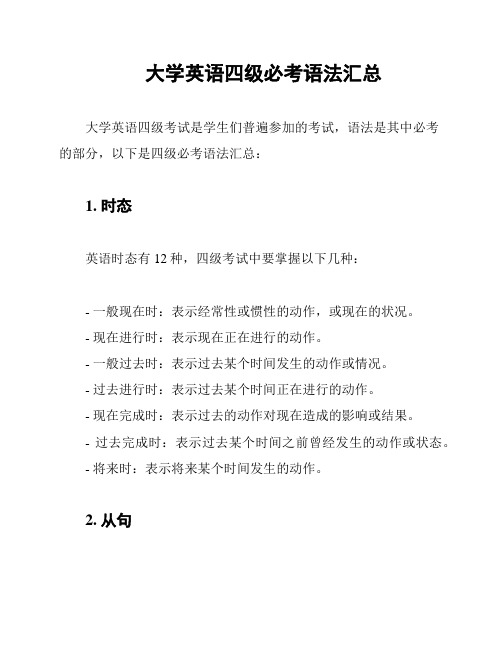
大学英语四级必考语法汇总大学英语四级考试是学生们普遍参加的考试,语法是其中必考的部分,以下是四级必考语法汇总:1. 时态英语时态有12种,四级考试中要掌握以下几种:- 一般现在时:表示经常性或惯性的动作,或现在的状况。
- 现在进行时:表示现在正在进行的动作。
- 一般过去时:表示过去某个时间发生的动作或情况。
- 过去进行时:表示过去某个时间正在进行的动作。
- 现在完成时:表示过去的动作对现在造成的影响或结果。
- 过去完成时:表示过去某个时间之前曾经发生的动作或状态。
- 将来时:表示将来某个时间发生的动作。
2. 从句从句是指一个完整的句子,它在句子中充当某个成分,四级考试中要掌握以下几种:- 定语从句:修饰某个名词或代词。
- 主语从句:作为主语的从句。
- 宾语从句:作为宾语的从句。
- 同位语从句:阐述前面名词或代词的内容。
- 状语从句:修饰或补充主句的内容。
- 结果状语从句:表示结果的从句。
- 让步状语从句:表示让步的从句。
- 条件状语从句:表示条件的从句。
3. 词性和词组四级考试中需要掌握名词、代词、动词、形容词和副词的用法,以及一些固定用法的词组,例如:- be based on:基于。
- be fond of:喜欢。
- as soon as possible:尽快。
- break the ice:打破僵局。
4. 语态英语语态有两种,四级考试中需要了解和区分主动语态和被动语态,以及两种语态在句子中的变化。
5. 语气英语语气有三种,四级考试中需要了解和区分陈述语气、祈使语气和虚拟语气。
以上就是大学英语四级必考语法的汇总,希望对大家备考有所帮助。
英语六级考试语法重点

英语六级考试语法重点改革后的英语四六级中,有些题型考生还不是很熟悉,以下是为大家搜索整理的考试语法重点,希望能给大家带来帮助!更多精彩内容请及时关注我们!1、情态动词的完成式1)must have done——表示对过去的事情较有把握的、肯定性的推测,常译为“一定,准是,肯定”,其否定形式是can’t/couldn’thave done,意为“决不可能,不太可能”。
e.g. Since the ditch is full of water, it must have rained last night.2)should/ought to have done——表示过去应该做的却没有做,常含有后悔、责备、埋怨的口吻,意为“本应该”,“应该就好了”; e.g. With all the work finished, I should have gone to your birthday party last night.3)shouldn’t/oug ht not to have done——表示过去不该做的事却给做了,也常含有责备、不满之意,意为“本不该”。
e.g. You shouldn’t have gone back to work yesterday without the doctor’s permission.4)may/might have done——表示对过去的事情的推测,但不十分有把握,意为“可能,或许已经”。
e.g. A traffic accident happened yesterday and a driver may have been hurt.5)could have done——表示过去有可能或有能力做某事,而实际未做、未能实现的事;有时也表示轻度批评,意为“本来可以,完全可以”。
e.g. The gas leakage could have been avoided if thegas company took immediate measures after the warning call.6)needn’t have done——表示过去做了某事,但没有做的必要,意为“其实没有必要”。
(完整word版)英语四级考试重点语法精选汇总

(完整word版)英语四级考试重点语法精选汇总⼤学英语四级语法精要⼀、动词(时态,语态,⽤法,省略,⼀致性等)(⼀)时态1、主动形式过去现在将来过去将来⼀般did do will/shall do should/would do进⾏was/were doing am/is/are doing will/shall be doing /完成had done have/has done will/shall have done should/would have done⽤于虚拟语⽓完成进⾏had been doing have/has been doing / /2、被动形式过去现在将来过去将来⼀般was/were given am/is/are given Will / shall begiven should/would be given进⾏was/were being given am/is/are being given / /完成was/were being given am/is/are being given / / 完成进⾏/ / / /· CET-4 常考的三种时态:过去完成时;将来完成时;(现在/过去)完成进⾏时。
·时间状语从句当中的时态:⼀般过去时所有的过去⽤⼀般现在时表⽰现在和将来现在完成时现在完成和将来完成3(have/has + -ing 分词构成): 动作或状态从过去某时开始,继续到现在,可能继续下去,也可能刚刚结束.· I’ve been writing letters for an hour. I’ve bee n sitting in the garden.4、过去完成进⾏时(由had been + ing分词构成): 过去某个时刻以前⼀直在进⾏的动作· We had been waiting for her for two hours by the time she came.5、将来完成进⾏时: 将来某个时刻以前⼀直在进⾏的动作.· By next summer, he will have been working here for twenty years.6、将来完成时(由shall/will have + 过去分词构成): 将来某时会业已发⽣的事.· I shall have finished this one before lunch.They’ll have hit the year’s target by the end of October.(⼆)语态1、可以有两种被动结构的类型,例如:· He was said to be jealous of her success.It was said that he was jealous of her success.·能同时适⽤于上述两个句型的主动词通常都是表⽰“估计”,“相信”等意义的动词,常见的有:assume,believe,expect,fear,feel,know,presume,report,say,suppose,understand等。
英语四六级重点语法

英语四六级重点语法英语四六级重点语法汇总动名词1. 某些动词后要接动名词某些及物动词后能用动名词而不能用不定式作宾语,其中最常用动词的有admit, avoid, appreciate, complete, consider, delay, deny, dislike, enjoy, escape, excuse, fancy, finish, forgive, involve, imagine, can’t help, mind, miss, postpone, practise, prevent, quit, resent, risk, resist, suggest等。
She suggested spending another day in the mountain area.There’s no way to escape doing the work.She is considering asking her employer for a rise.Note:①在need、want、require、deserve等动词后的动名词相当于不定式的被动式The clock needs/wants repairing. (=The clock needs/wants to be repaired)The disabled deserve respecting. (=The disabled deserve to be respected.)②在like、hate、prefer等动词后,如果表示一般倾向,则用动名词作宾语;如果指具体的某次发生在将来的行动,则要用不定式。
I like reading books of this kind, but I don’t like to read that book.She prefers walking to cycling.I prefer to stay at home today.③在remember、forget、regret等动词后,如果用动名词作宾语,则表示该宾语的动作发生在动词谓语的动作之前;如果用不定式作宾语,则表示宾语的动作发生在动词谓语的动作之后I remembered locking the door. (=I remembered that I hadlocked the door.)I remembered to lock the door (=I remembered that I was to lock the door.)I regret telling you about it. (=I regret that I told you about it.)I regret to tell you he has fallen ill. (=I regret that I am to tell you he has fallen ill.)2. 动名词作介词的宾语动名词可作介词的宾语,与介词一起构成介词短语,在句中作定语、状语或表语。
2023年6月大学英语四级考试语法复习指导(1)
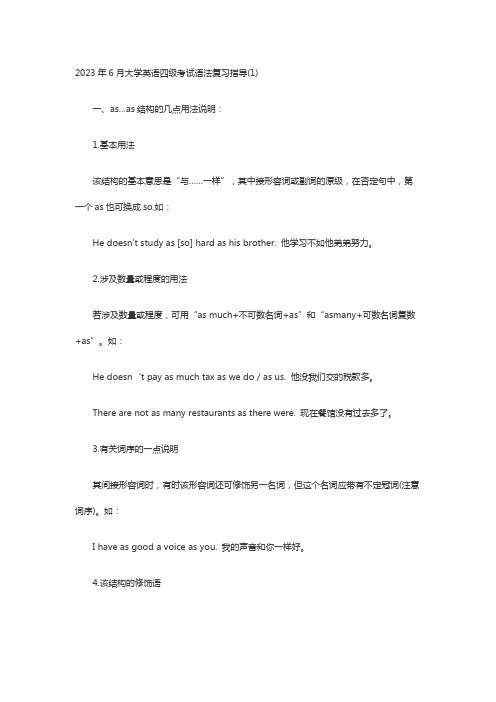
2023年6月大学英语四级考试语法复习指导(1)一、as…as结构的几点用法说明:1.基本用法该结构的基本意思是“与……一样”,其中接形容词或副词的原级,在否定句中,第一个as也可换成so.如:He doesn't study as [so] hard as his brother. 他学习不如他弟弟努力。
2.涉及数量或程度的用法若涉及数量或程度,可用“as much+不可数名词+as”和“asmany+可数名词复数+as”。
如:He doesn‘t pay as much tax as we do / as us. 他没我们交的税款多。
There are not as many restaurants as there were. 现在餐馆没有过去多了。
3.有关词序的一点说明其间接形容词时,有时该形容词还可修饰另一名词,但这个名词应带有不定冠词(注意词序)。
如:I have as good a voice as you. 我的声音和你一样好。
4.该结构的修饰语根据情况可用(not) nearly, almost, just, nothing like, exactly, not quite, half, one-ten, twice, threetimes, 30 per cent等修饰,并且这些修饰语必须置于第一个as之前,而不能置于其后。
如:This room is twice as large as that one. 这个房间是那个房间的两个大。
You‘re not half as clever us you think you are. 你远不是自己想像的那么聪明。
It took three times as long as I had expected. 这件事比我预料的多花了两倍的时间。
二、first与at first用法区别详解:1、从词性上看区别first可用作形容词或副词,有时还可用作代词;而at first作为介词短语,只起副词用作用(在句中用作状语)。
四级语法知识汇总

四级语法知识汇总在英语四级考试中,语法是重要的一个部分,涉及到形式、用词、语法结构等多个方面。
下面是四级语法知识的汇总,希望能够对大家备考有所帮助。
一、名词1.可数名词和不可数名词2.可数名词复数变化规则- 一般在词尾加-s,如book-books, pen-pens。
- 以-s, -ch, -sh, -x, -o结尾的名词在词尾加-es,如bus-buses, watch-watches, box-boxes。
- 以辅音字母加-y结尾的名词,变-y为-i再加-es,如city-cities, baby-babies。
- 特殊变化,如man-men, woman-women, child-children, foot-feet。
3.名词所有格在名词后加-apostrophe(" ' ")和-s表示所有格,如the girl's book。
如果名词后已经有-s,则只需要加-apostrophe(" ' ")表示所有格,如the students' books。
如果名词是不可数名词,则在其后加-of来表示所有格,如a cup of tea。
二、代词1.人称代词人称代词包括主格、宾格、所有格等,如I(me, my, mine), you(you, your, yours), he(him, his), she(her, hers), it(its), we(us, our, ours), they(them, their, theirs)等。
2.指示代词指示代词包括this, that, these, those等,用来指示特定的人或物。
如This is the book I want。
3.反身代词反身代词包括myself, yourself, himself, herself, itself, ourselves, yourselves, themselves,用于表示动作的承受者和动作的执行者是同一个人,如I hurt myself when I fell down。
大学英语四级语法知识

大学英语(CET--4) 语法学习提纲一、词类、句子成分和构词法:1、词类:英语词类分十种:名词、形容词、代词、数词、冠词、动词、副词、介词、连词、感叹词。
1、名词(n.):表示人、事物、地点或抽象概念的名称。
如:boy, morning, bag, ball, class, orange.2、代词(pron.):主要用来代替名词。
如:who, she, you, it .3、形容词(adj..):表示人或事物的性质或特征。
如:good, right, white, orange .4、数词(num.):表示数目或事物的顺序。
如:one, two, three, first, second, third, fourth.5、动词(v.):表示动作或状态。
如:am, is,are,have,see .6、副词(adv.):修饰动词、形容词或其他副词,说明时间、地点、程度等。
如:now, very, here, often, quietly, slowly.7、冠词(art..):用在名词前,帮助说明名词。
如:a, an, the.8、介词(prep.):表示它后面的名词或代词与其他句子成分的关系。
如in, on, from, above, behind.9、连词(conj.):用来连接词、短语或句子。
如and, but, before .10、感叹词(interj..)表示喜、怒、哀、乐等感情。
如:oh, well, hi, hello.2、句子成分:英语句子成分分为七种:主语、谓语、宾语、定语、状语、表语、宾语补足语。
1、主语是句子所要说的人或事物,回答是“谁”或者“什么”。
通常用名词或代词担任。
如:I’m Miss Green.(我是格林小姐)2、谓语动词说明主语的动作或状态,回答“做(什么)”。
主要由动词担任。
如:Jack cleans the room every day. (杰克每天打扫房间)3、表语在系动词之后,说明主语的身份或特征,回答是“什么”或者“怎么样”。
- 1、下载文档前请自行甄别文档内容的完整性,平台不提供额外的编辑、内容补充、找答案等附加服务。
- 2、"仅部分预览"的文档,不可在线预览部分如存在完整性等问题,可反馈申请退款(可完整预览的文档不适用该条件!)。
- 3、如文档侵犯您的权益,请联系客服反馈,我们会尽快为您处理(人工客服工作时间:9:00-18:30)。
英语四六级考试七种重点语法
1.英语四六级考试中虚拟语气。
强调说话人的主观愿望和假想情况。
考生应着重复习能引起虚拟语气的某些介词、介词短语和连词(如lest,in case,otherwise等);一部分表示建议、主张、命令、紧要等概念的词语,由于本身隐含说话人的主观愿望,其后的主语从句、宾语从句、同位语从句往往采用should+动词原形;虚拟倒装句;在would rather,wish,as if,its time that等句型中使用适当形式表达主观愿望;混合虚拟句。
2.英语四六级考试中主谓一致。
这类考题灵活性大,需要根据实际情况判断谓语动词的单复数形式。
一部分具有生命意义的集合名词做主语时谓语动词多采用复数形式,如people,poultry,militia等;用and连接的成分表单一概念时谓语动词用单数;就近原则:主语中含有某些连词(如as well as, besides,in addition to等)时,谓语动词的数同第一个主语保持一致。
3.英语四六级考试中倒装结构。
表示强调或突出,分为全部倒装和部分倒装。
那些否定词(组)、介词短语能引起倒装句,部分倒装和全部倒装有和区别,as在倒装结构中的用法及意义等等,都是考生应当重视的地方。
4.非谓语动词。
这是词汇与结构考试中语法部分的重中之重,解题时可以从三个方面入手:①根据非谓语动词同其所修饰的名词或逻辑主语的一致关
系,确定使用主动语态或被动语态,然后考虑采用现在分词、现在分词被动式或过去分词;②非谓语动词同主句谓语动词动作发生的先后关系。
动作正在进行的用现在分词进行式,同时发生或不分先后发生的用现在现在分词一般式或过去分词;在主句谓语动词之前发生的用现在分词完成式、不定式完成式;发生在主句谓语动词之后的多用不定式一般式;③表状态多用分词,表目的多用不定式。
5.英语四六级考试中独立主格题。
一般说来,在句子中没有连接词的情况下,逗号是无力连接两个句子的,其中一个分句要么是非谓语形式,要么是独立主格结构。
这两种结构都做状语,不同的是独立主格结构有自己的逻辑主语。
6.时态。
英语中一共有16个时态,最常用的5个时态是一般现在时、现在进行时、一般过去式、一般将来时和现在完成时。
四级考试中出现最多的考点是将来完成时、现在完成时、过去完成时和完成进行时。
针对这一题型,考生首先要抓住的就是时间状语,是现在时间、将来时间还是过去时间?是短暂时间还是延续性时间?
7.英语四六级考试中名词性从句。
形容词性的定语从句是考核的重点,用什么引导词,引导词前面的介词形式,引导词在从句中做什么成分(做宾语、主语还是状语等),从句的语序等等均有可能成为考点。
此外,主语从句、同位语从句、宾语从句也应适当复习。
